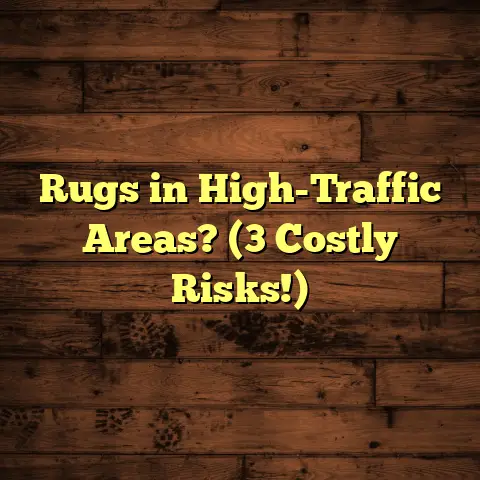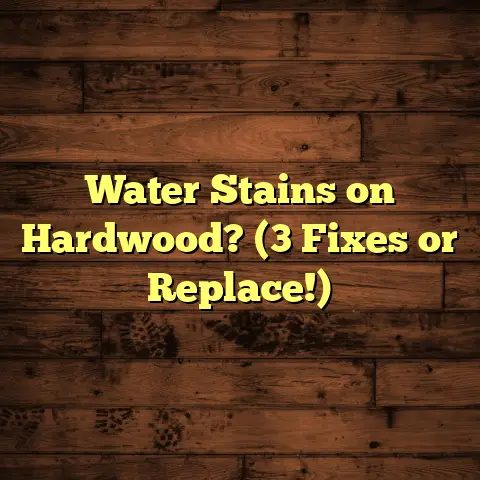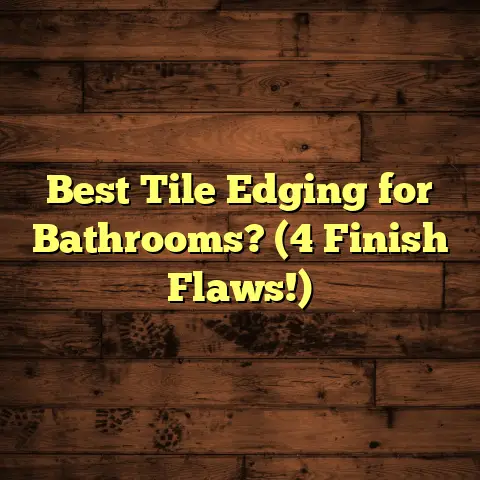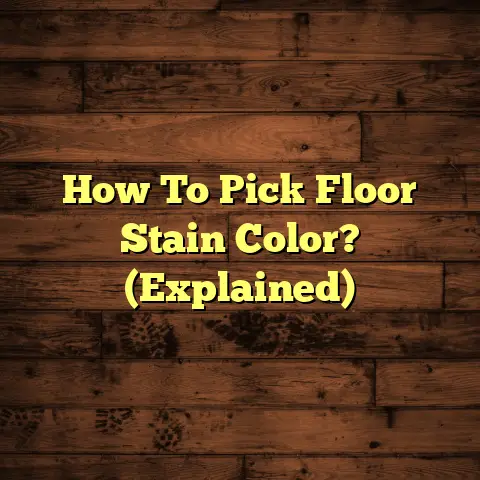Best Garage Concrete Sealer? (Sealer Showdown!)
For many of us, it’s more than just a place to park the car. It’s a workshop, a storage unit, a kids’ playroom on rainy days – a central hub for family life.
I’ve seen garages transformed from cluttered chaos to organized havens, and the key often lies beneath our feet: the concrete floor.
Think about it: that floor endures a lot – oil spills, dropped tools, muddy boots, and the occasional rogue skateboard.
That’s where concrete sealers come in.
A good sealer isn’t just about aesthetics; it’s about protecting your investment, preventing damage, and creating a safer, more enjoyable space for your family.
Imagine a garage where you don’t cringe at every spill, where your kids can play without you worrying about dust and debris, and where your DIY projects are actually… enjoyable!
That’s the power of a well-sealed garage floor.
In this article, I’m diving deep into the world of garage concrete sealers.
I’ll break down the different types, discuss the factors you need to consider, and review some of the top products on the market.
So, grab a cup of coffee, and let’s get started on transforming your garage into a family-friendly space!
Section 1: Understanding Garage Concrete Sealing
Okay, let’s get down to the nitty-gritty.
What exactly is a concrete sealer, and why is it so important for your garage floor?
Simply put, a concrete sealer is a protective coating applied to concrete surfaces to prevent damage from moisture, chemicals, and wear.
Think of it like sunscreen for your concrete!
There are two main types of concrete sealers: penetrating and topical.
Penetrating sealers soak into the concrete pores, creating a chemical barrier that repels water and other liquids.
They don’t change the appearance of the concrete much, which is great if you like the natural look.
Topical sealers, on the other hand, form a protective film on the surface of the concrete.
These can provide a glossy or matte finish and offer excellent resistance to stains and abrasion. Epoxy sealers are a popular type of topical sealer, known for their durability and chemical resistance.
The Chemistry Behind the Magic
How do these sealers actually work? Well, it’s all about chemistry.
Penetrating sealers typically contain silicates, siloxanes, or silanes.
These chemicals react with the calcium hydroxide in concrete to form a strong, insoluble barrier.
Topical sealers, like epoxies, create a polymer film that bonds to the concrete surface, providing a tough, protective layer.
The key is proper preparation.
A clean, dry surface is essential for the sealer to bond correctly.
Why Seal Your Garage Floor?
So, why should you bother sealing your garage floor in the first place?
Here are a few key benefits:
-
Stain Resistance: Sealers prevent oil, grease, and other spills from penetrating the concrete, making cleanup a breeze.
-
Moisture Protection: Concrete is porous, meaning it can absorb water.
This can lead to cracking, spalling (surface flaking), and even mold growth.
Sealers prevent water from entering the concrete, protecting it from these issues.
-
Enhanced Durability: Sealers protect the concrete from abrasion and wear, extending its lifespan.
-
Dust Reduction: Unsealed concrete can produce a lot of dust, which can be a nuisance and even a health hazard. Sealers bind the concrete particles together, reducing dust.
-
Aesthetics: Sealers can enhance the appearance of your garage floor, giving it a clean, polished look.
According to the Portland Cement Association, sealing concrete can significantly extend its service life, reducing the need for costly repairs or replacements.
Section 2: Factors to Consider When Choosing a
Garage Concrete Sealer
Choosing the right concrete sealer for your garage can feel overwhelming.
There are so many products on the market, each with its own set of features and benefits.
Don’t worry, I’m here to help you narrow it down.
Here are the key factors to consider:
-
Type of Concrete: Is your concrete new or old? New concrete needs to cure for at least 28 days before sealing.
Old concrete may have existing damage that needs to be repaired before sealing.
-
Garage Usage: How do you use your garage? If it’s just for parking cars, you’ll need a sealer that can withstand heavy traffic and oil spills.
If you use it as a workshop, you’ll need a sealer that’s resistant to chemicals and abrasion.
And if your kids play in the garage, you’ll want a sealer that’s non-toxic and slip-resistant.
-
Local Climate: Temperature fluctuations and humidity can affect the performance of concrete sealers.
In cold climates, you’ll need a sealer that can withstand freeze-thaw cycles.
In humid climates, you’ll need a sealer that’s resistant to mold and mildew.
-
Desired Finish: Do you want a glossy or matte finish? Glossy finishes are more reflective and easier to clean, but they can also be slippery.
Matte finishes are less reflective and provide better traction, but they may be more difficult to clean.
-
Ease of Application: How comfortable are you with DIY projects?
Some sealers are easier to apply than others.
Consider the preparation steps, application method, and curing time.
-
Maintenance: How much maintenance are you willing to do?
Some sealers require regular reapplication, while others can last for several years.
Family Needs: A Key Consideration
When choosing a garage concrete sealer, it’s important to think about your family’s specific needs.
Do you have young children who play in the garage?
If so, you’ll want a sealer that’s low in VOCs (volatile organic compounds) and non-toxic.
VOCs are chemicals that can evaporate into the air and cause health problems.
Look for sealers that are certified by organizations like Green Seal or UL GREENGUARD.
Do you have pets?
If so, you’ll want a sealer that’s resistant to pet urine and scratches.
Do you use your garage for DIY projects?
If so, you’ll want a sealer that’s resistant to chemicals, solvents, and abrasion.
And if you live in an area with harsh winters, you’ll want a sealer that can withstand salt and de-icing chemicals.
Think about your family’s lifestyle and choose a sealer that meets your specific needs.
Section 3: Top Garage Concrete Sealers Reviewed
Alright, let’s get to the good stuff!
I’ve researched and reviewed some of the top garage concrete sealers on the market.
I’ll break down the pros and cons, discuss the application process, and highlight any family-friendly features.
Disclaimer: I’ve used my experience and research to compile this review. Always follow manufacturer instructions and safety precautions when applying any sealer.
Product 1: Rust-Oleum EpoxyShield Garage Floor Coating
-
Product Overview: Rust-Oleum EpoxyShield is a two-part epoxy coating that provides a durable, high-gloss finish. It’s designed to resist hot tire pickup, oil, grease, and chemicals.
-
Pros:
- Very durable and long-lasting.
- Provides a high-gloss, professional-looking finish.
- Resistant to hot tire pickup, oil, grease, and chemicals.
- Relatively easy to apply with proper preparation.
-
Cons:
-
Requires thorough surface preparation.
- Can be slippery when wet (consider adding an anti-slip additive).
- Strong odor during application (requires good ventilation).
- Application Process: The EpoxyShield kit includes everything you need to get started.
You’ll need to clean and etch the concrete surface, mix the two parts of the epoxy, and apply it with a roller.
Curing time is typically 24-72 hours. * Performance: EpoxyShield provides excellent protection against stains, chemicals, and wear.
It’s a great choice for garages that see heavy use. * Family-Friendly Features: While the EpoxyShield itself isn’t specifically marketed as family-friendly, you can improve its safety by adding an anti-slip additive.
Also, ensure proper ventilation during application to minimize exposure to VOCs.
Product 2: Behr Premium Wet-Look Sealer
-
Product Overview: Behr Premium Wet-Look Sealer is an acrylic-based sealer that provides a protective, glossy finish.
It’s designed to enhance the natural look of concrete and protect it from water damage.
-
Pros:
- Easy to apply with a brush, roller, or sprayer.
- Provides a glossy, “wet-look” finish.
- Water-based formula with low VOCs.
- Affordable and readily available.
-
Cons:
-
Not as durable as epoxy coatings.
- May require more frequent reapplication.
- Not as resistant to chemicals and abrasion as epoxy.
- Application Process: Behr Premium Wet-Look Sealer is easy to apply.
Simply clean the concrete surface and apply the sealer with a brush, roller, or sprayer.
Curing time is typically 24 hours. * Performance: This sealer provides good protection against water damage and stains.
It’s a good choice for garages that don’t see heavy use. * Family-Friendly Features: The water-based formula with low VOCs makes this a more family-friendly option compared to some epoxy coatings.
Product 3: Foundation Armor SX5000 Water Based Silane
Siloxane Penetrating Concrete Sealer
-
Product Overview: Foundation Armor SX5000 is a penetrating silane siloxane sealer designed to protect concrete from water damage, salt, and freeze-thaw cycles.
-
Pros:
- Penetrating sealer, so it doesn’t change the appearance of the concrete.
- Excellent water repellency.
- Resistant to salt and freeze-thaw damage.
- Long-lasting protection.
-
Cons:
-
Doesn’t provide a glossy finish.
- Not as resistant to oil and grease stains as topical sealers.
- Application Process: Apply with a roller or sprayer. Make sure the concrete is dry before application.
- Performance: Provides great protection against water damage but less protection against oil.
- Family-Friendly Features: Low VOC.
Product 4: Eagle Armor Ultra Protect
-
Product Overview: Eagle Armor Ultra Protect is a water-based, clear, non-yellowing acrylic sealer.
It’s designed for both interior and exterior applications and offers resistance to UV damage, water, and chemicals.
-
Pros:
- Easy application.
- UV Resistant.
- Water based.
-
Cons:
-
Less durable than other options.
- Application Process: Easy to apply with a roller or sprayer.
- Performance: Good water resistance and UV protection.
- Family-Friendly Features: Because it’s water-based, it’s low in VOCs.
Product 5: Sikaflex Concrete Fix
-
Product Overview: Sikaflex Concrete Fix is a polyurethane-based sealant and adhesive designed for repairing and sealing concrete cracks and joints.
It offers excellent adhesion and durability.
-
Pros:
- Excellent adhesion to concrete.
- Flexible and durable.
- Weather resistant.
-
Cons:
-
Can be difficult to apply neatly.
- Limited color options.
- Application Process: Requires a caulking gun for application.
- Performance: Great for sealing cracks.
- Family-Friendly Features: Low VOC Content.
Product 6: Valspar Concrete Sealer
-
Product Overview: Valspar Concrete Sealer is a silicone acrylic waterproofer that protects against water damage, mildew, and stains.
-
Pros:
- Easy application.
- Good water protection.
- Affordable.
-
Cons:
-
Not as durable as epoxy.
- Application Process: Easy to apply with a roller, brush, or sprayer.
- Performance: Good for water resistance and protects against mildew.
- Family-Friendly Features: Water based and low VOC.
Product 7: Drylok Concrete Protector
-
Product Overview: Drylok Concrete Protector is designed to waterproof and protect concrete surfaces from water damage, efflorescence, and freeze-thaw cycles.
-
Pros:
- Excellent waterproofing capabilities.
- Resistant to mildew.
-
Cons:
-
Can be difficult to apply evenly.
- Requires multiple coats.
- Application Process: Apply with a brush, roller, or sprayer, ensuring even coverage.
- Performance: Excellent waterproofing and protects against mildew.
- Family-Friendly Features: Low VOC content.
Product 8: Quikrete Concrete Sealer
-
Product Overview: Quikrete Concrete Sealer is an acrylic-based sealer that provides a protective coating against water damage, stains, and UV exposure.
-
Pros:
- Easy to apply.
- Protects against UV damage.
- Affordable.
-
Cons:
-
Less durable than other options.
- Application Process: Apply with a roller, brush, or sprayer.
- Performance: Good protection against water and UV damage.
- Family-Friendly Features: Low VOC content.
Remember to always check the manufacturer’s instructions and safety data sheets (SDS) before using any of these products.
Section 4: Application Tips for Family-Oriented Spaces
Okay, you’ve chosen your sealer. Now it’s time to get to work!
But before you start slathering on the product, let’s talk about some important application tips, especially when you’re dealing with a family-oriented space.
Preparation is Key
Proper preparation is crucial for a successful sealing job. Here’s what you need to do:
-
Clean the Concrete: Remove all dirt, debris, oil stains, and loose concrete. You can use a pressure washer or a concrete cleaner for this step. Pro Tip: For stubborn oil stains, try using a degreaser or a poultice made of baking soda and water.
-
Repair Cracks and Holes: Fill any cracks or holes with a concrete patching compound. Pro Tip: Use a flexible patching compound for cracks that are likely to expand and contract with temperature changes.
-
Etch the Concrete: Etching opens up the concrete pores, allowing the sealer to penetrate and bond properly. You can use an etching solution or a mechanical grinder for this step. Pro Tip: Always wear safety glasses and gloves when working with etching solutions.
-
Rinse Thoroughly: After etching, rinse the concrete thoroughly with water to remove any residue.
-
Let it Dry: Allow the concrete to dry completely before applying the sealer. This may take 24-48 hours, depending on the weather.
Step-by-Step Application
Here’s a general guide to applying concrete sealers:
-
Read the Instructions: Always read and follow the manufacturer’s instructions for the specific sealer you’re using.
-
Apply a Test Patch: Before applying the sealer to the entire floor, test it in a small, inconspicuous area to make sure you like the color and finish.
-
Apply the Sealer: Use a brush, roller, or sprayer to apply the sealer in thin, even coats. Avoid applying too much sealer at once, as this can lead to drips and puddles.
-
Allow to Cure: Allow the sealer to cure completely before walking or driving on the floor. Curing time varies depending on the product, but it’s typically 24-72 hours.
Timing is Everything
When you’re sealing a garage that’s used by your family, timing is crucial.
You want to minimize disruption and ensure everyone’s safety.
Here are a few tips:
-
Choose a weekend: This will give you plenty of time to complete the project without rushing.
-
Pick a day with good weather: Avoid sealing on rainy or extremely hot days.
-
Inform your family: Let your family know when you’ll be sealing the garage and how long it will take.
-
Plan alternative activities: Have some family-friendly activities planned for when the garage is off-limits.
Family-Friendly Activities While Curing
While the sealer is curing, you’ll need to keep everyone off the garage floor.
Here are a few family-friendly activities to keep everyone entertained:
-
Movie night: Pop some popcorn and watch a family movie.
-
Board game tournament: Dust off your favorite board games and have a tournament.
-
Arts and crafts: Get creative with paint, paper, and other craft supplies.
-
Outdoor adventure: Go for a hike, bike ride, or picnic.
Conclusion
So, there you have it!
A comprehensive guide to choosing and applying the best garage concrete sealer for your family.
Remember, a well-sealed garage floor isn’t just about aesthetics.
It’s about protecting your investment, preventing damage, and creating a safer, more enjoyable space for your family.
By considering your family’s specific needs and following the tips in this article, you can choose a sealer that will enhance your garage experience for years to come.
Now go forth and seal! Your family (and your garage floor) will thank you.





